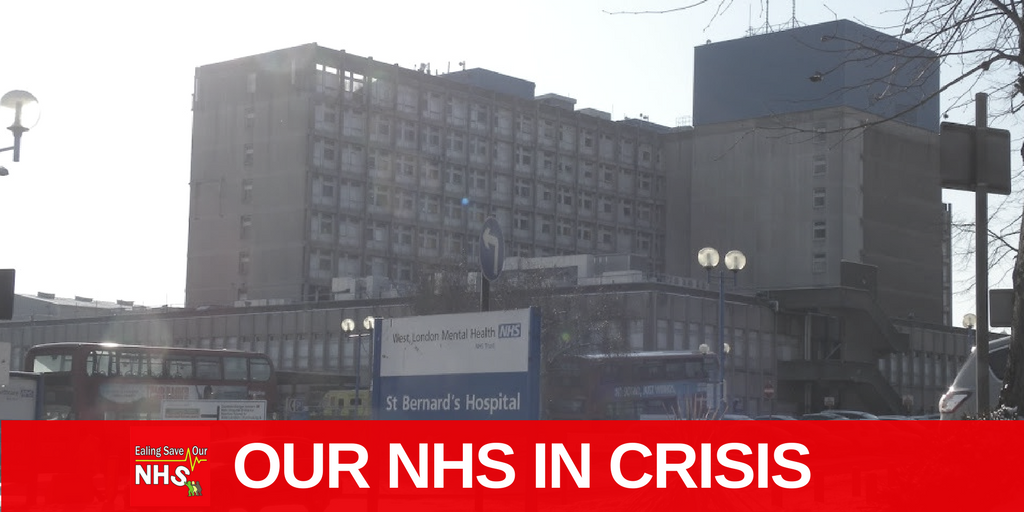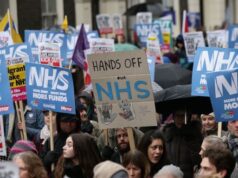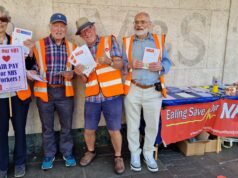Issue: 12
April 2014
This occasional newsletter is researched, written and edited by a group of concerned residents in Ealing, West London who want to preserve our NHS. We view the wholesale engagement of private, for-profit healthcare service suppliers as unnecessary, profligate and dangerous. Process improvement is what is needed in our NHS – not revolution.
Demand Drives Investment in State Transport – But Not Investment in State Healthcare
Adding runways at Heathrow, building a new airport on ‘Boris Island’ in the Thames Estuary and creating HS2 – are all examples of UK plc driving investment to meet current and projected travel demands. However when it comes to healthcare the Government is clearly devoted to the notion that in the face of rising current demand and rising projected demand cutting £20 billion off NHS costs is the way to go.
In January 2014 we had the highest ever recorded waiting-for- NHS-treatment figures. 2.9 million patients.
We make it quicker, easier and better for people travelling but you might not be alive to avail yourself of this – or you might have to travel in considerable pain.
Welcome to the sixth richest country in the world.
The People’s Inquiry into London’s NHS – A Unique Evidence Base Underpins 18 Recommendations
A group of experienced and well informed healthcare experts recently ran The People’s Inquiry in to London’s NHS. It involved hearing contributions from 95 people at seven public meetings throughout London , 30 hours of oral transcripts, 50 written submissions and evidence taken from the public, NHS staff, professional bodies, medics, clinicians and the great and good (and possibly the bad). Started in autumn 2013 the independent six-person panel was chaired by former NHS trust chair Roy Lilley. The Trade Union Unite funded the inquiry. The Executive Summary and much of the evidence can be viewed at www.peoplesinquiry.org.
The recommendations are indeed wide ranging but include the future of PFI, public engagement and funding, transparency, integration and right up-to-date the impact of Section 119 of the Care Bill (soon to be enacted). At the very least I urge you to view the 10 page Executive Summary.
Scrap Equal Rights When Assessing New Drugs Says NICE Boss
Sir Andrew Dillon, Chief Executive of the National Institute for Health and Care Excellence (NICE) stated last month that saving the lives of the elderly is less valuable to society than saving younger people. Critics have argued that this is blatant age discrimination. Extra weighting by NICE when assessing new drugs for end-of-life-treatment is being abolished. So much for my paying National Insurance then for 43 years.
Nicholson Out.. and Stevens In
This month sees Simon Stevens finally and formally take over running the NHS from disgraced David Nicholson. Nicholson’s exit has been ‘graced’ by his plea for more cash for the NHS. This might have been be construed as a glorious farewell gesture were it not for the fact it was he who told us all in May 2009 that the NHS must cut costs by £20 billion by 2015.
Leaving private healthcare giant UnitedHealth (where he was ‘Global Health President’) to run our free universal healthcare service Mr Stevens will clearly have profit and loss on his mind. He has graciously agreed to be paid only £189,000 in his first year – just £46,500 more than our Prime Minister.
Nicholson’s tenure at the helm of the NHS became unsustainable when the Stafford Hospital scandal revealed that at its worst he was then running the local health authority.
MENTAL HEALTH
Bosses of many UK mental health charities wrote to ‘The Guardian’ last month warning of the dangers of cutting funding for mental health services by 20%. The proposal has been made by NHS England and Monitor. The mental health charity bosses further point out that 28% of the NHS’s disease burden is mental health but mental health attracts just 13% of the budget. This makes a complete farce of the Government’s promise of ‘parity of care’ and ‘parity of esteem’ between physical illness and mental illness. As for aspirations for 24/7 operations in mental health services this surely is a cruel joke.
Roy Lilley of nhsManagers.net has recently pointed up the fact that the Bedroom Tax is shifting families out of their homes to areas where housing is cheaper. Children have to change schools, parents might lose employment (if they have any), friendship circles are lost and families broken up. Cuts in Social Services mean there are no job clubs, support services…. ‘This puts pressure on the NHS, not least Mental Health Services’.
The Elderly
There are 10 million people in the UK over 65 years of age. According to the Royal College of Psychiatrists (RCP) 10% of them have mental health problems. That’s two million people. In Ealing there are 34,000 over 65 year olds so 3,400 with mental health problems. In my Electoral Ward there are 1,419 people over 65 years old so 141 of them have mental health problems. One wonders just how many of my troubled neighbours have been diagnosed and/or are being treated? Just how many of them have close family carers?
And the Young
The Princes Trust tells us that 750,000 young British people feel that owing to unemployment they cannot cope with day-to-day life. 25% of young people who are long term unemployed have been prescribed antidepressants and 32% have felt suicidal.
Private Mental Health Care Provider Sees ‘Significant Growth Opportunities in the Mental Health Market’
Cambian, the UK’s biggest private mental health services supplier, is planning to raise £20 million via a flotation on the London Stock Exchange. The flotation is likely to value the company at around £500 million on 2013 earnings of £41.1 million. The company is, owned by private equity investors GI Partners, and provides services to more than 1,100 mental health patients in over 60 facilities across the UK. As well as providing mental health services the company also offers educational facilities to children with autism, learning disabilities and challenging behaviour. The 10 year old company employs 6,000 people across 23 schools, 35 hospitals, 188 specialist homes and three fostering offices.,
MENTAL HEALTH IN EALING
Most of the mental health services in Ealing are provided by the West London Mental Health Trust (WLMHT). WLMHT employs 3,500 staff and attempts to meet many of the mental health cares needs of the 770,000 people who live in Ealing, Hounslow and Hammersmith & Fulham. In 2012 WLHT employed 4,000 staff. Dr John Lister of London Health Emergency estimated in 2012 that between £43 and 54 million would be cut from the WLHMT budget between 2012 and 2015.
However the draft Ealing Clinical Commissioning Group (ECCG) mental health budget for 2014/15 (beginning today) is £46.019 million. In 2013/14 it was £45.003 million. Of this year’s budget WLMHT is allocated £31.871 million (in 2013/14 it was £33.005 million). This year there is also £2.110 million for Improving Access to Psychological Therapies (IAPT) and £2.573 million for High Cost Area Supplement (HCAS) both relating to WLMHT services. Neither of these amounts are much changed from 2013/14.
Budget cuts and ‘reconfigurations’ of staff are apparently ongoing at WLMHT. But capital investments are still being made. However the jury is still out on the efficacy and utility of the new £250,000 WLMHT ‘Meridian’ Electronic Patient Feedback System so revered by management.
Support for Carers
West London Mental Health Trust (WLMHT) has allocated £150,000 to be spent by volunteers over each of the next three financial years (April to March) to improve mental health service user and carer experiences in Ealing, Hounslow, Hammersmith & Fulham. One might naively think that that is the role of WLHMT, and the three Clinical Commissioning Groups along with the three Local Authorities.
WLMHT’s Flippa Watkeys (Local Services Recovery & Involvement Lead/Professional Lead for Occupational Therapy) and WLMHT service user Jane McGrath are running a WLMHT project (currently called ‘The Voice’) with service users and carers to try and formulate how this money might be spent. No carer is part of the team running this project. The Voice currently has no written draft Constitution
A number of meetings of The Voice have taken place in 2013 and 2014, most of them apparently dominated by service users. The latest meeting took place at St Bernard’s Hospital on 14 March 2014. It has already been decided that the Accession social enterprise will ‘host’ The Voice. Accession was set up largely by effort and finance from WLMHT and the London Borough of Ealing. The Voice describes Accession as ‘an independent social enterprise’. Accession will get £30,000/year for its efforts. This leaves £120,000 each year to help improve the lots of the service users and carers in the 770,000 tri-borough area population. Using the RCP estimates quoted above there are some 7,700 over 65 year olds with mental health problems in the WLMHT catchment area. If only 50% of them have family/loved one carers that means around 3,850 volunteer carers for over 65 year olds alone. That’s a lot of people spread out over a wide geographic area.
At the 14 March 2014 meeting a group of carers presented some views on how some of the £120,000 annual grant money should be spent to expand and improve carer support. However the tone of most of the meeting was that most (all?) of the £120,000 would be spent on service users by service users. I’m part of the Carers’ Group based at Avenue House in Acton. This group offers excellent support, information and training for carers across Ealing. LBE has discontinued its grant to the group so it’s looking like being broke as from today. I attended the WLMHT Carer’s Strategy Group Meeting on 25 March 2014 (ably Chaired by WLMHT Service Manger Kieran McCann) at which it was resolved unanimously that some of the £120,000 should be used to support existing Carers’ groups in Ealing, Hounslow and Hammersmith & Fulham. It will be interesting to see how much of these suggestions find their way into The Voice’s business plan which is due in July 2014.
On 26 March 2014 I spoke to Dr Serena Foo, GP Lead for Mental Health, about funding for mental health carers. She did seem to grasp what I was saying but whether ‘quick’ money can be found quickly to help the Avenue House based Carers’Group and other similar groups in Ealing is anybody’s guess. How frustrating it is to have to lobby both the mental health services purchaser and the mental health service supplier in order to try to get even miniscule funding.
Support for GPs
A support group of four mental health Primary Health Care workers has been established to provide mental health support to Ealing GPs. We understand that two of them are locums. Anecdotally it’s proving hard work training some of the Ealing GPs at the 30+ Ealing GP practices who have signed up to providing Primary Care mental health services. (There are 79 GP practices in Ealing). Instead of 24 hour real time psychiatric telephone support, the Ealing GPs have seemingly decided on just one hour of psychiatric consultant telephone support during the weekday daytime. How this will assist a suicidal patient who presents him or herself at even a participating Ealing GP surgery for seven of the eight hour GP weekdays is worryingly difficult to deduce.
EALING HOSPITAL
Apparently Ealing Hospital Trust (EHT) has managed to break-even in its financial year which ends today. This is in spite of ‘Non NHS Staff Costs (Agency)’ of over 17 million which were budgeted in February 2013 at £1.73 million. Still when NHS bosses (led by McKinsey and Co) condemned Ealing Hospital to death in 2012’s ‘Shaping a Healthier Future’, why would anyone want a permanent staff post at Ealing Hospital?
At a public meeting attended by 150 people on 26 March 2014 Ealing Council Leader Julian Bell announced that Ealing Hospital’s Maternity Unit would close by February 2015. On 27 March 2014 I attempted to attend an EHT Board Meeting to confirm financial and maternity details. But closed doors kept the public out for over 40 minutes as confidential matters were discussed by a worried looking Board. I left before the public were allowed into the meeting.
Apparently the ‘must have’ merger between EHT and the North West London Hospitals NHS Trust has been delayed by three months as everyone and his brother has to sign off the finances which underpin the deal.
EHT has got a £500,000 grant to equip District Nurses and Midwives with ‘mobile working technology’. We might find that there are more ‘tablets’ than District Nurses as only five new District Nurses qualified throughout the whole of London in 2013.
NHS Rates Ealing Hospital as The Best Performing Hospital in London
Truly astonishing performance figures have just emerged from NHS Trust Development Authority slides shown at the ‘London Trust Chairs Meeting, 16 January 2014’. Of all the NHS Trusts reviewed in London, Ealing Hospital Trust came out overall top in the only three ‘Performance Highlights’ slides. In the ‘Referral To Treatment (RTT) Months Achievement of 90% Standard’ performance metric – which measures how quickly a hospital treats a patient – Ealing came first. In the ‘NHS Cancer Plan 62 Day Standard’ Ealing came way out in front. In the ‘Year to date A&E Performance’ Ealing came second. Of the 42 cases of MRSA diagnosed throughout London only one case was at Ealing Hospital.
The Coalition Government and NHS bosses signposted plans in 2012 to close Ealing Hospital A&E, Maternity, Paediatrics and downgrade the service to one provided by just by GPs and nurses. Recruiting permanent staff at the hospital against a backdrop of doom and gloom about its future has been very challenging. Temporary staff costs are well over £10 million for the current financial year just ended.
In 2006, the Healthcare Commission interviewed 75,000 patients throughout England. Out of 165 Acute and Specialist Trusts in England, Ealing Hospital was rated as providing the worst care of all of them.
All the staff at Ealing Hospital should be congratulated on their current performance. Dr William Lynn and Mr David McVittie, who jointly run the hospital, deserve special praise.
NHS Strike on the Cards Nationally and 150 On Strike at Ealing Hospital
Health Secretary Hunt in a seeming attempt to goad 600,000 NHS staff into industrial action has frozen their pay. Unite the Union is consulting its 100,000 NHS members regarding industrial action. The Royal College of Nursing accused Mr Hunt of treating nursing staff and patients with contempt. The TUC commented that its members were being hit by an escalating cost-of-living crisis whilst 2,400 NHS bosses were earning more than the Prime Minister.
At Ealing Hospital Trust (EHT) 150 domestic, catering, porters and help desk workers are earning at an hourly rate of £6:31 some 44% below comparable London NHS workers. They receive no sick pay. These poorly paid GMB members work for EHT outsourcers Compass Medirect. They went on strike in February 2013 and again from 14 to 21 March 2014. EHT management detects no disruption in safe and effective services. Clearly EHT/NHS have no blanket commitment for their suppliers to pay the London Mayor’s London Living Wage of £8:80/hour.
EALING CLINICAL COMMISSIONING GROUP
Our attempts to get a meeting with ECCG Chair Dr Mohini Parmar in March were unsuccessful. We had a date but then she postponed the meeting until 2 April 2014 when she’ll just have returned from her skiing holiday. In her place as Chair at the public ECCG meeting on 26 March 2014 surprisingly was appointed lay member Philip Wood. At this meeting ECCG Chief Officer Daniel Elkeles waxed lyrically about co-commissioning and the federation of the five CCGs ECCG (CWHHE) is now embedded into. NHS Co-commissioning, perhaps currently illegal until the law likely changes in October 2014, is where two or more NHS Service Commissioners align their priorities while retaining responsibility for their own resources. Critics of this practice bring up a range of related issues which include coercion, lobbying, personal influence and conflicts of interest. At least Mr Elkeles is cognisant of the latter as he himself raised it as an issue to be resolved.
Community Care – Underfunded and Possibly Unsustainable
Only 8.39% of the NHS budget is spent on community care – the rest is spent on hospitals. The community care share has been falling since 2003/4. The Royal College of GPs (RCGP) warned in March 2014 that GP services are ‘under severe threat of extinction’ because they cannot cope with the growing demand for care. RCGP also reported a ComRes finding that 28% of patients in England are currently unable to book an appointment within the week of their request. The RCGP says that the NHS needs another 10,000 GPs in order to provide timely access and high quality care.
6 out of 10 GPs are considering early retirement says the British Medical Association (BMA) online tracker survey. 50% of GPs also say that their workload is unmanageable and that their morale is either low or very low.
BUPA Global Profits are Up, But Says it Can’t Make Enough Profit Out of NHS Trusts
BUPA, one of the oldest private healthcare companies in the UK, upped its global profits last year to £635 million. However, BUPA claims that it can’t make enough profit out of NHS Trusts when providing chemotherapy, intravenous feeding and rehabilitation at home for elderly and bed ridden patients. BUPA treats 28,000 NHS patients.
NHS CCGs Want To Train Us All in Planning, Designing and Commissioning Healthcare Services
Five free sessions for patients and carers in Ealing and Hounslow are being offered this training at Ealing CCG offices in Greenford April through July 2014. Email healthwatchcwl@hestia.org for more information or to register.




